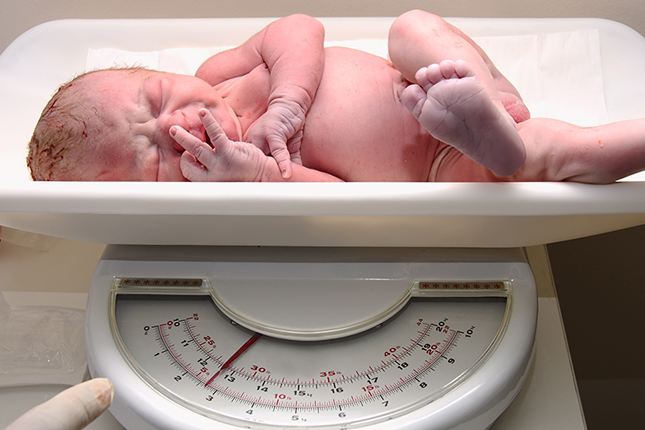Newbies
Breastfeeding Your Baby: Losing 10% of Birth Weight
[00:00:00]
Please be advised, this transcription was performed from a company independent of New Mommy Media, LLC. As such, translation was required which may alter the accuracy of the transcription.
KRISTEN STRATTON: When your baby is born, one of the first things everyone ask is how much does he weigh. Well, this is an important piece of information for your friends and family. It is also important for your support team including your lactation consultant. But, when your baby begins to lose weight those first two days, does this mean breastfeeding isn’t going well or something else affect the baby’s weight on the scale?
This is Newbies.
[Theme Music/Intro]
KRISTEN STRATTON: Welcome to Newbies. Newbies is your online on the go support group, guiding new mothers through their baby’s first year. I'm your host, Kristen Stratton, Certified Birth Doula, Postpartum Doula and Owner of In Due Season Doula Services. If you haven’t already, be sure to visit our website at www.NewMommyMedia.com and subscribe to our weekly newsletter. You can also subscribe to our show through iTunes, so you automatically get new episodes when they’re release. Here is Sunny with details on how you can get involved with Newbies.
SUNNY GAULT: All right, hi everybody. So first of all, I want to give you guys awesome props because our listener shift for Newbies has increased pretty dramatically over last couple months, so I don’t like to question that, it just like to say, hey thank you guys for listening to the show. That’s awesome. It was more, more people listening.
We also are looking for you guys to get involved in the show because we believe this is your show and you should be part of this, so you always have an opportunity to join our shows and be a parent on our show and contribute that way. And so the best way to do that is head over to our website at www.NewMommyMedia.com and you'll see some banners and stuff that promote the fact that we’re always looking for parents to be part of our show.
Click the banner, there’s a quick online form that you can fill out. You can also join our close Facebook group where we post all of our topics and our times, and we really want you to get involve, that’s really easy. You can record straight from your home computer and yeah, we’re just trying to get more, more people involved with the show. So that’s one way you can get involved.
Another way is to our segments that we do on the show and one of those segments is “5 minute of our birth stories”. So if you have a new baby, your burst story is probably fresher in your head, right? And we do want to hear those, and it doesn’t just have to be the positive, oh, everything work done exactly like I wanted it too, I mean, when does that actually happen anyway, right?
But it can be a struggle kind of our story and something that you came through in the end, and something that’s motivating and helpful for other parents out there that maybe struggling with something. So if you have a birth story you would like to share, we go on five minute birth stories because we like to tell them in five minutes or less and yes, I know that can be a challenge because there’s a lot of details there but the best way to do that is head on over to our website, again, it’s www.NewMommyMedia.com .
There’s gray banner on the side that says send voicemail, and we would actually like to hear you share your stories, so that way, it’s just more special when you hear the mom telling her birth story of her baby. And so, again, a couple great ways to get involved with our show and thank you so much for listening because the show is all about you guys.
KRISTEN STRATTON: Let’s meet the mamas joining our conversation today. Tell us a little bit about yourself, your family and your experience with today’s topic.
ANGIE: My name is Angie. I am married with one daughter. She just turned one in March. And we had a hard time getting her to gain weight at first since she actually lost a little bit of weight. So I'm excited to hear what the expert has to say about the topic.
KRISTEN STRATTON: Great, well, welcome to the show.
RUTHII SLATTUM: I'm Ruthii Slattum. I'm married. I have three children. My son is five, and then I have two daughters who are three and 10 months. I am primarily lactation consultant and I'm also postpartum doula and I do a number of other postpartum care services and I own Momma Ruthii. And I have varying experiences with breastfeeding. Weight gain has never been a big struggle for my babies but I definitely can remember being on edge that my first baby was less than what he was born at as a first time mommy, you know, and I was reassure that that was normal but I can remember having that out of, oh, he weighs less now than when he was born. That’s kind of weird.
SUNNY GAULT: Hi everyone, I'm Sunny. And I have four kiddos of my own. And I remember, let’s see, first of all, I should say their ages. So my oldest is five then I have a four year old, and then I have twins that are two and a half. And I think I experience with all of them. I think I experienced just that concern like Ruthii was talking about, I was like, well, I'm not really, like that’s kind of weird.
They’re losing weight and you’re all kind of obsessed about that initial birth weight and then so to hear like ones to you, like all my babies were born in a hospital, so once I left the hospital, it’s kind of like, well, they weighed less now and I really did have that 10% in my head a lot because I didn’t want to have to do formula, and so I just felt like it was, this weird challenge with my body like, can my body create enough colostrum to be able to support this, and what’s going to happen over the next couple of weeks, you know, they going to tell me if this first pediatrician appointment that I’ve got a supplement.
So I did feel a lot of pressure. I will say I think I felt a lot more pressure with the twins because I was having to provide more colostrum for them and I was really like common milk, come in, come in, come in, let’s do this, and it came in when it was supposed to but again, it was still kind of that anxiety really of you know, which I'm sure wasn’t good for my milk supply of you know, can we make this you know, or so I kind of drop below 10%.
KRISTEN STRATTON: Well, hello everyone. I'm Kristen. I'm your host and like everyone, I have breastfeed my babies, and with my first. We actually ended up going to formula because I thought I wasn’t making enough milk. So I'm really excited that we’re doing this episode because I think it’ll give mammas some relief and some hope and hopefully some forgiveness of themselves. So I'm really excited. Welcome to the show everybody.
[Theme Music]
SUNNY GAULT: All right. So before we dive in to our main topic today, we’re going to talk about the new headline that I found. This is positive headline. I love sharing good positive stories, it involves an airline. You guys may have heard of JetBlue in the past. JetBlue has kind of turned this whole concept of babies crying on an airplane, it’s kind of turn it on its head because when we have little kids, I think most parents are like cringing about the idea of even taking one baby on an airplane, right? Especially if you’re a brand new parent, you’re like, I don’t know what’s going to happen. I remember my husband and I were like, should we buy like Starbucks, gift cards to give the people when this happens? Like I don’t know.
I don’t know about you guys but before I had kids, I was one of those people that rolled my eyes every time a baby cry and I just didn’t get it, but now that you’re parents, you’re on the other side of the equation. JetBlue for one flights, we have to kind of prefaced with this, one flight, they actually said, they said to everyone, they said okay, when you hear a baby cry, you’re going to get 25% of your next JetBlue flight. Now, this particular article I'm looking at now, it says, okay, flight 213 from New York to Long Beach California. This is across the United States. This is a long flight, right? So everyone is kind of an edge just in general because it’s multiple hours, right?
And so, this article doesn’t actually say if they got to 100% but I would imagine that in a flight that long, that people would hear babies cry more than four times, so I'm assuming everybody got a free flight out of this and I'm not sure if it was kind of stage, it’s kind of a marketing thing because they’re certainly nothing that says that they’re going to continue with this and I'm sure they’ve got a lot of coverage of this, so who knows the anterior mode of fear but it was certainly a good thing for all of the parent. I'm sure all the parents on that flight with their babies were like, oh good. We have to worry about this. And it says in this article that whenever baby cried, that everyone would actually cheer which come on, you don’t get on flight, right?
So wanted to see what you guys thought about this. It’s just kind of a marketing move for JetBlue, do they really have the right intentions with this? It doesn’t really matter because people got free flight. So Kristen, what do you think?
KRISTEN STRATTON: I love this. I think it was brilliant marketing first of all.
SUNNY GAULT: Right.
KRISTEN STRATTON: And then, secondly, it kind of reminds me of like when you go to restaurant at some places, if a waiter drops a plate and it breaks, they go, woo, you know, they cheer. I like that they were kind of embracing like hey, this is an inevitability when you’re flying on a plane with kids. They don’t understand. They’re curious or they don’t know how to pop them. They’re confining this tight little space, and let face it like adults aren’t really happy on flights and were cute little tiny children who can’t rationalize time or space that where they’re going to be happy. So I like that they’re embracing the fact that hey, we’re all in this flight together. Let’s just help each other out rather than being the grumpy comedian that just grumbles every time a baby is unhappy, so yeah, way to go JetBlue.
SUNNY GAULT: Yeah, Angie, what do you think, as a mom that has a younger baby? What do you think? If you went on a JetBlue flight and they’re like hey, every time the baby cries, 25% off, what do you think about that?
ANGIE: I would’ve like to be on that flight. Yeah, because I have taken three flights with my baby so far and each time, it’s just stressful because I think if she starts to cry, people will get angry so I'm constantly nursing her to keep her quiet. And so I think if JetBlue did this all the time, it would make me little less stressed as a mom and maybe do the same thing for other moms too, calm everyone down.
SUNNY GAULT: Right. They might go bankrupt if they did this all the time but I like the idea. I mean, I think in marketing wise. It could even work to say, hey, we’re going to pick random flights. That way, you don’t even know. You don’t know if you’re going to get, I mean I think that’s actually you know, JetBlue if you’re listening, you know, that’s actually really smart marketing move. Ruthii, what do you think?
RUTHII SLATTUM: I would be pinching my baby. No! Free flights for everybody. I think it’s nice. I do think that yeah, and I think it could be a nice thing. I like the randomized thing of you know, you’re one of our three flights this month that if babies are upset, you do this. I think in a long run, I can’t imagine from a business point of view that that’s going to be good for them purely monetarily but having some little thing of free wine for everybody who has, you know, who have a baby crying for a certain amount of time or I don’t know.
SUNNY GAULT: Right, yeah.
RUTHII SLATTUM: I think that the gesture is nice.
KRISTEN STRATTON: Free wine for the parents.
SUNNY GAULT: Right, you have to deal when the baby cry.
RUTHII SLATTUM: Right. I like the idea.
SUNNY GAULT: Yeah. I like the idea, some sort of perk. I mean, I realized the free flight thing can be you know, pretty costly but, and I don’t even know what they give away free now, maybe free Wi-Fi, free something, you know, whatever, movies that they’re playing that they charge for whatever, so, just some ideas out there. We’ll go ahead and we’ll post the link if you guys haven’t seen, we’ll post it to our Facebook page so you can check it out.
[Theme Music]
KRISTEN STRATTON: Today on Newbies, we are continuing our series on breastfeeding your baby. Our expert is Clinical Lactation Specialist, Postpartum Doula and Owner of Momma Ruthii in San Diego California, Ruthii Slattum, thank you for joining as Ruthii and welcome to the show.
RUTHII SLATTUM: Thank you for having me and I'm excited to be your expert this time.
KRISTEN STRATTON: Yeah, Ruthii has been on our show as a panelist, so it’s nice to see on the other side of the table huh.
RUTHII SLATTUM: A little in there being said it’ll be fun.
KRISTEN STRATTON: So Ruthii, please explain why birth weight and breastfeeding are related.
RUTHII SLATTUM: It’s definitely related. It’s really that first marker that care providers are using to monitor waking. It is normal for babies to lose some weight after birth. It’s expected. Every baby loses weight after birth. It’s just a matter of how much weight is lost and when does it become a concern. Day four is usually the lowest weight for any baby and it tends to coincide with that period right before mom’s mature milk comes it.
It is frustrating as a lactation consultant to hear oh, my milk didn’t come in until day, you know, five or six and my baby was starving and so I had to get formula and there was you know, we already have milk. Our body is in the third trimester are already generating colostrum which is a milk. It is your baby’s perfect first food.
There is that misconception with the term milk coming in where it’s like well, your mature milk you know, which has you know, there’s more volumes of it and it’s you know, with sustains on older baby but when your baby is born, their stomach is tiny. It only holds about five milliliters or a little bit more than five milliliters in a first couple of days.
So your baby only needs my mute amounts of milk, and I encourage new moms or expectant moms to take one of those little syringes that you use for medicine and do five milliliters and squirt that into a bottle that you would pump into and see how much milk your baby actually needs when they’re brand, brand new, and then by the time they’re 10 days old, it’s about the size of a ping-pong ball, and that’s an ounce and a half-ish.
So your baby, that frustration is my baby was nursing constantly and I just felt like they were starving and all they wanted to do is nurse and it’s like well, they needs that. They needs smaller more frequent feedings in that first week because their stomach can only hold so much in that again is very much normal. And then as far as like birth weight are specifically is concern, they do like your baby’s birth weight to be back up by two weeks, that’s kind of the standard, and a lot of pediatricians will inadvertently panic moms where it’s like oh, my baby is two week old and they’re not back up to birth weight yet but there’s a lot of circumstances surrounding the baby’s birth that may lead to inflated birth weight.
You really have until three weeks before it’s a major concern and there are all kinds of different reasons why that may or may not happen.
KRISTEN STRATTON: So we always hear about this 10%. So what is significant about losing 10% or more of baby’s birth weight when evaluating the breastfeeding relationship with mom?
RUTHII SLATTUM: So when I'm evaluating the breastfeeding relationship as a lactation consultant and we’re looking at weights, I can sit-down and do the math and we can look and it’s again a guideline up until 10%, there’s not necessarily something wrong but after you’re kind of tip over that 10%, it does become more serious as far as addressing what’s going on. It could be you know, the baby is just not nursing frequently enough. It could be the baby is not transferring well. So even though they only need you know, like I said, five milliliters in a feeding, they for, numerous reasons maybe or not getting that but it’s you know, it also depends on the size of the baby. If you have a smaller baby, then losing half a pound is a going to be a bigger deal than if it’s like an eight or a nine pound baby.
So, sorry, my chicken was doing something really weird outside my window and it’s truly completely off. I'm so sorry.
SUNNY GAULT: I love that you have a chicken.
RUTHII SLATTUM: Her name is Kevin. So my brain is like, what is Kevin doing? So sorry, and he’s a ridiculous looking chicken. She has his poof on top of her head, so I'm so sorry.
SUNNY GAULT: Confused by the chicken.
RUTHII SLATTUM: What was I'm saying. Yeah, so we’re 10% weight loss. So after day four, infants really should gaining weight again and yes.
KRISTEN STRATTON: So Ruthii, what are some of the anatomical issues which can cause weigh looseness for three days?
RUTHII SLATTUM: That’s such a loaded question. I now, I was like mean old Kristen coming up with these question, because anatomical issues, through anatomical issues that lead to an extremely poor or even no breastfeeding relationship are extremely rare. Most issues that are leading to infant weight loss are going to be mismanagement of the breastfeeding relationship and usually that’s the latch. So there are anatomical issues that can create challenges with a latch. I'm sure every mom has heard about tongue-tie or lip-tie and not to discount that that can truly be an issue and a genuine challenge for many, many people, many moms that are dealing with the breastfeeding infant. It’s over blamed for being the reason.
I personally have had two. Both my girls have tongue-tie or lip-tie and tongue-tie issues. And my older daughter, we did not do any kind of like surgical address. We didn’t do the Frenectomy, the clipping the tie at all, and I was absolutely able to manage her latch with some tricks from, I had a friend who was a lactation consultant. I was not a lactation consultant at that point and it was actually through the course of me taking my classes that I figured out that she had a lip-tie and it was pretty serious too. It can be an issue but you know, you put it up on a Facebook mom group and everybody’s first question is have you been check for lip-tie? Have you been check for lip-tie? Have you been check for tong tie?
And again, it absolutely can be the cause but you really need to go and see a lactation consultant before you can really blame that because if everybody lips up their lip, you’re going to have a friend and everybody has one. Even if a baby has a pretty obvious Frenulum, it’s not necessarily going to impact breastfeeding. It can, but how is the range of motion? How is the baby’s sleep positioned during latch? You know, there’s so many factors into going into it than the fact that you can actually see a Frenulum whether that’s on the lip or underneath the tongue. That is so manageable most of the time if it’s caught early on. It’s definitely something to be aware of but I wouldn’t look into it or dwell on it unless there’s a reason too.
I would address the baby’s latch first before you jump to blaming their tongue or their lip. And then, a palate can also be an issue. If you have a baby that has a palate and that tends to go hand and hand with a lip-tie or tongue-tie, they’re both midline issues, and that impacts where the nipple hits the palate when you're breastfeeding and it can be really painful. So again, there are tips and trick with working with the lactation consultant to help moms address that if it is an issue. And then moms too can have you know, sometimes nipples can cause issues. If you have a mom that has flat or inverted nipples, it can cause, you know, it can make it a little harder, but babies who’ve been breastfeeding for hundreds, thousands of years obviously and a baby doesn’t know that that nipple isn’t “perfect”.
And most nipples absolutely a baby can nurse off of, they just might need a little more help because the nipple is not hitting their palate to trigger their suck reflex correctly but you know, we’re really bless, we live in a time where we do have tools like we do have nipple shields which I urge extreme caution with. They definitely have their place and they can be a fabulous tool but there are ways to help moms you know, if nipples are not “clinically ideal”. That’s another thing, and there’s thing like insufficient glandular tissue and again, that’s really hard for a mom to say because you can have a mom who has small breasts but that doesn’t have anything to do with her milk production.
I’ve work with plenty of moms who are like an A or B you know, smaller breast but they have this extremely happy chunky babies and they’re making milk that’s basically cream. So it’s not an indicator that a mom is going to have a hard time breastfeeding. And on the other side of that coin, you can have women who has luxurious breast. She’s got very full cups but the actual glandular tissue that he has is not adequate.
She has plenty of fatty tissue but just by looking at the breast, you can be like, oh well, you should be able to produce milk, but sometimes, that is not the case, and then surgeries too if you have a mom that had a breast reduction surgery in particular. She’s going to have a very hard time breastfeeding. Yeah, I mean there’s so many things that cause issues but it’s really hard to be like these are the things because I don’t want to mom to suck herself up before she even has the baby to think that she’s going to have an issue because her nipples are not perfect or she has small breasts.
SUNNY GAULT: One thing I was going to say is if you guys are listening and you’re like oh, I have a lot more questions about breastfeeding. I didn’t say this off the top of the show but we have a whole podcast dedicated to breastfeeding and pumping. It’s called The Boob Group. We just wanted to touch on this a little bit today, and like Ruthii said, we don’t want to do on anyone with anything, you know, potential problems and all that kind of stuff but if you have specific questions first of all, if you access to a lactation consultant, that’s fantastic but I also encourage you to check out our podcast for The Boob Group because we’ve like over 160 episodes dedicated to everything, breastfeeding and pumping. So I just want to put in a little plug for that.
KRISTEN STRATTON: All right, so to our parents, do you recall what your baby’s birth weight was and what weight gain concerns your experience in the hospital of if you birth outside the hospital, what those first few days were like?
ANGIE: I birth in a hospital and according to lactation consultant, I was producing colostrum just fine. She was really happy with how much I was producing but it took few days for my milk to come in. And I think with Ruthii was saying earlier that moms will get really stressed out this first two days because their child is just nursing and nursing and that’s what was happening with me, I didn’t feel like I was giving her enough. She was always hungry and always nursing and I was in pain and she was always crying. She was born at 7 pounds, 12.5 ounces and by the time we went in for her first check with the pediatrician, she had drop down to 6 pounces, 8 ounces. She had jaundice. And all babies are born with jaundice but this got worst.
You could tell if she’s getting more and more yellow. So he gave us, the pediatrician gave us some samples of formula and said, you know, until your milk comes and you’re just going to have to supplement. And the funniest thing about that was we left the pediatrician’s office. We go to CVS. We get the formula, the bottles, get everything setup. We get back home and ask my husband is making the formula bottle, my milk latched out. I'm on the couch and screaming like, what do I do? You got the formula ready. I have milk ready. Do I feed her or do I use the formula? What do we do? But we end up supplementing anyway just taking our back to that weight but that was the scary time. I didn’t know if I was producing enough or if she was going to starves yet.
Well, and jaundice has its own set of challenges. There are exceptions that are made a lot of times in supplementing what with jaundice.
SUNNY GAULT: I can talk a little bit about what happen with my twins. So my twins were, they were born as preemies but they weren’t really tiny preemies. They’re 35 weekers and they were both about 5.5 pounds. So pretty good size actually. Yeah, and they didn’t need the NICU or anything like that but they were my smallest babies I’d ever had. My first son was over 9 pounds and then my second son was about 7.5, he was pretty average, but I remember with the girls, we have the jaundice thing kind of going on with the girls too and some other issues that we’re working through and I remember because we were dealing with the last weight with them that like every ounce really counted like I remember being more concerned about that because they did weighs much, right?
So you don’t have as much flexibility with how much weight they can lose and I know that they had to be life over 4.5 pounds before they would leave the hospital, and they were, I mean, I can’t remember exact numbers because it’s about two and a half years ago now, but I do remember them being big enough so that they could leave the hospital but then like I said, they need to go see the pediatrician like right away, I think it was like the next day. We had to take them in and it’s just a little nerve racking but I have to say, I kind of pat myself on the back because Michael Ostrom was kind of coming in full force in the hospital, and I went in in giving birth to my babies thinking oh my gosh, I really need to hand express. I need to do all these kind of stuff.
I got to get this supply up because I knew how important those first few days were going to be and like I said, I really wanted to try to just feed my baby’s breastmilk as possible. And so, I remember I'll never forget this. I remember some lactation consultant, it was more than one and maybe there were some nurses, there are two came in to my room because I was in the hospital for about three days because it was cesarean to have the babies.
So these nurses were coming in and I don’t know like how many must’ve been like you know, one of those like little plastic cups that they usually put towels and stuff in. I think it like the measurement, I think milliliters. I don’t know but I was able to like fill those things up with colostrum for the twins. And this was within a day or so after the baby is being born. I remember they were like patting me on the back, and like, oh my gosh, look at your colostrum, this is amazing. And I was like oh no, I what’s so excited because I was like thank you buddy, thank you buddy for doing what I wanted you to do.
So yeah, definitely can happen but yeah, and that’s really all they needed and so, thankfully we didn’t need to supplement. I had to exclusively pump in the beginning because their latch wasn’t as good. But again, it was breastmilk and it’s what I wanted.
KRISTEN STRATTON: When we come back, we will continue our discussion about early newborn weight loss and breastfeeding. We will be right back.
[Theme Music]
KRISTEN STRATTON: Welcome back to the show. We are talking with clinical lactation specialist Ruthii Slattum. Ruthii, can medications or fluids that a mother receives in labor or in preparation for a cesarean birth effect baby’s birth weight and therefore be perceived at weight loss later on?
RUTHII SLATTUM: Absolutely. The biggest cooperate typically is IV and women don’t realize, when you get an IV when we’re in labor, if we like let’s say a mom has make a 12 hour labor and you go within your own IV fluid for let’s say eight hours, then that’s eight hours of a lot of fluid in your body, so when you know, a lot of moms will notice when they leave the hospital, they’re kind of puffy. They got like some edema going on. And then over the next couple of days, it really goes down and they drop a tone of water rate. Same thing happens with our babies. So we have babies and especially if it was a long labor, I always ask the mom who has weight loss concerns, how long she was on an IV for. And most of the time, it was for several hours.
And so, when your baby is born, they also have a lot of water weight. So if you have a situation where your baby, it’s over the first couple of days drops a lot of weight, it’s like okay, let’s pay attention and make sure we’re doing small frequent feedings but if by day, you know, like I said day four is usually the lowest. If after about day four day five, they don’t start to pick up their weight again, then it’s like okay, let’s pay attention. Let’s really push initiating feeding, making sure that we’re pushing baby to eat enough.
Then also when we do anything like an epidural, they put our bodies to sleep. So sometimes it can take our bodies an extra day or two to wake up, and this is especially true as cesarean mamas because they’re put under such heavy anesthesia that can really take them until you know, it can be days, six or seven until their mature milk comes in.
So during that time, you really need to be on top of feeding your baby every two hours and so, those are the two biggest things that can really cause issues with weight gain in particular.
KRISTEN STRATTON: And assuming that means that all those excess fluids can also affect mom’s breast shape if she’s retaining all that extra fluid that may also affect latch as well.
RUTHII SLATTUM: Absolutely, and that was personally my biggest speed bump with my first baby was you know, day three, my mature milk came in and all of the sudden, the bed is full of boobs and I don’t know what to do. I had this screaming baby and he was hungry and I couldn’t get into latch because my breast were too tight and I didn’t have a pump at that point, so just you know, called my mom in tears and she say, okay, I'll go take a hot shower, just try the massage out as much as I can. So yeah, breast edema, that was the one thing that I think I wish I would’ve been warn about because I had a hospital birth with him, was hey, you were on an IV, do not be shock when you wake up and each one of your boob as a size of your head because it might happen.
And so, just knowing enough to hand express enough to get it to where my breast was soft enough for my baby to latch because if it feels like the back of your hand, your baby can’t latch on that. Your breast should really feel more like your forearm, a little bit softer so that you baby can actually get their little lips to create a seal.
KRISTEN STRATTON: Yeah, and you know, what you are sharing Ruthii, I totally remember that when my milk came and I had a C-section with my first and so of course was full of fluid from IV and then, also my milk came in actually pretty quickly within probably 48 hours considering a C-section but I didn’t realize that that’s what it was because like a lot of first my moms, I read what to expect when you're expecting and I thought I knew everything about birth and breastfeeding and I didn’t. And so, my milk came in, my boobs were as hard as rock. I was in pain. My daughter also had an upper lip-tie and I didn’t know what that was or how to fix that or deal with that.
My husband was station at military base and the neighbor hospital there and she says, oh, well, she sent me home with a nipple shield and I was like, I don’t know what to do with this. So I pump some milk and I fill and entire bottle and I was like, okay, well, I guess I'm not going to be able to feed her. I guess I'll just pump and give her a bottle because obviously, there’s something with ability to breastfeed. And then of course, because I didn’t know how to pump properly, my milk supply quickly dwindled and we ended up supplementing with formula which I kick myself for many, many years over until I had my boys who I successfully breastfeed for a long time.
And stress, I didn’t realize stress was such a component to milk supply and getting baby to gain weight those first few days and weeks because my husband was deploying four weeks after I had my baby, so I just had a C-section. My husband was leaving. We were in the process of moving. I didn’t know how to breastfeed properly so I thought it wasn’t me.
So all the moms listening out there, just know that you know, be gentle, be kind with yourself because there’s so many things that just affect our milk supply, and when someone comes up to you like they did to me and said, oh, well, your baby dropped to 11% of their birth weight. They loss fat, so you know, maybe breastfeeding is just not right for you. You know, just forgive yourself. It’s not always your fault, and sometimes we’re just doing the best we can with the information we have at that time, and you know, we just love our babies and that’s all we can do.
So Ruthii, to that point, for the parents who choose to or who need to use formula, what can they do to facilitate a healing breastfeeding on brand new relationship while they work on the latch?
RUTHII SLATTUM: There are alternative. So let’s say your pediatrician is you know, your baby is let’s say five days old and they’re not gaining weight as fast as the pediatrician would like or you know, there is something like jaundice going on which can make a baby really sleepy which following their cues is not good because they won’t wake up, so you need to you know, create your own. But you know, so if someone is saying, hey weight is a concern. We should consider supplement and be like okay, well, can I increase my feedings? Can I pump in between my feedings and supplement with breastmilk? So if your supply is not an issue that is a really great option.
And then you can supplement at the breast with that’s really handy dandy little tube called a supplemental nursing system, an SNS which is basically like a straw, so you can put your baby to your breast and then slip this little tube in between their lips and put the other in a bottle and then you can guarantee that they’re getting a certain amount of calories and be like, okay, well, I know they at least got 15 milliliters or you know, depending on the age and I know they at least got an ounce, so that can be really great. And you can also use that same thing with formula if your supply is an issue. And there are instances for formula is completely appropriate and you can use the supplemental nursing system with that too while you work on baby’s latch and get it up today lactation consultants.
We’ll prefer to use a bottle because there is a journey when we concern and that is the quickest way to get calories into a baby. They do have their place but it really should be you know, use with caution in working with a lactation consultant. And it’s really great if you’re having concerns with breastfeeding and your pediatrician is making suggestions that you’re not happy about, say, can I be referred to a lactation consultant? With pediatricians, you know, they have to know so much about everything that a lot of times, they’re not as current on breastfeeding as they should be, and that’s you know, there’s so much the thing you need to know, so asking for a specialist if you’re having challenges with that is really important to do.
KRISTEN STRATTON: Well, thank you so much Ruthii and our wonderful parents for joining us today in our discussion about early newborn weight loss in breastfeeding. and for Newbies Club members, our conversation will continue after the end of the show, as Ruthii will discuss about the colostrum and how it is designed to sustain your baby. For more information about the Newbies Club, please visit our website at www.NewMommyMedia.com .
[Theme Music]
SUNNY GAULT: Before we wrap up our show today, we have a “Baby Oops", you guys know a “Baby Oops" is if you listen to Newbies. This is our segment where we share our funny stories about caring for a baby, so funny things perhaps that our babies did or you know, that we did as parents when we look back and we’re like, what were we thinking? Okay, so one of our listeners, Becky sent us and this is pretty funny I thought. Since we’re talking about feeding today and everything, Becky I think was a first time mom when this happened to her. So I think we can all think back to when we were very first time moms with our first babies and what we knew back then, probably wasn’t as much as we know now, right?
So Becky writes:
“I remember the first night in the hospital with my dear son. He woke up in the middle of the night because he was hungry. I had no clue. I had changed him. I gave him a pacifier, it didn’t work. I was sleepy and I wanted to go back to sleep. I tried to rock the carrier they rolled him and just to suit him, that didn’t work, and nurse had to come in and tell me that he was hungry and I needed to nurse him, LOL, she said I was 20. I was never told that they wake up at all hours to feed throughout the night”.
So I just thought that was kind of funny because we’re thinking as moms, first of all, we sleep deprived right? And we’re thinking, okay, I changed the diaper like I cuddle with my baby. I’ve done all these kinds of stuff, and then we forget, oh yeah, they kind need to eat.
And so you know, and keep up that 10% of body weight, right? So Becky, thanks so much for sending this and admitting your “Baby Oops". We really do appreciate it. If you’re listening and you think oh, I’ve got this funny story that I’d love to share. We would love to hear it. You can go to our website at www.NewMommyMedia.com , click on the contact link and you can email us, that’s what Becky did, or the way that I really like and I mentioned that early on the show is still go to our website that there is that grey banner on the side for send voicemail and then you can share your story yourself and we’ll just include that in the future episode. So again, thanks Becky and hopefully, we’ll get more of this soon.
[Theme Music]
KRISTEN STRATTON: That’s wraps up our show for today. We appreciate you listening to
Newbies.
Don’t forget to check out our sister show:
• Preggie Pals for expecting parents
• Parent Savers for parents with infants and toddlers
• Twin Talks for parents with multiples and
• Boob Group for moms who breastfeed
This is Preggie Pals, your pregnancy you way.
[Disclaimer]
This has been a New Mommy Media production. The information and material contained in this episode are presented for educational purposes only. Statements and opinions expressed in this episode are not necessarily those of New Mommy Media and should not be considered facts. While such information and materials are believed to be accurate, it is not intended to replace or substitute for professional, medical advice or care and should not be used for diagnosing or treating health care problem or disease or prescribing any medications. If you have questions or concerns regarding your physical or mental health or the health of your baby, please seek assistance from a qualified health care provider.
SUNNY GAULT: New Mommy Media is expanding our line-up of shows for new and expecting parents. If you have an idea for a new series, or if you’re a business, or organization interested in joining our network of shows through a co-branded podcast, visit www.NewMommyMedia.com.
[00:40:00]
[End of Audio]












